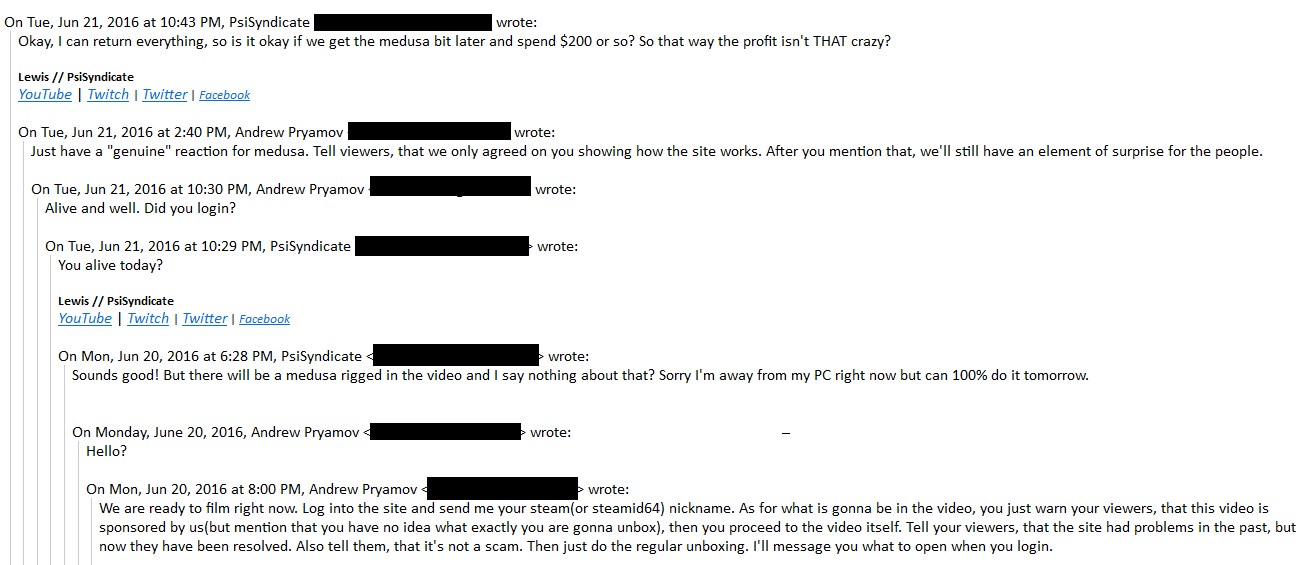Emails reveal how shady CS:GO gambling promotions are born
This is how a deal is made.

The past week has been an ugly one for the CS:GO gambling scene. First it came to light that popular YouTubers Trevor 'TmarTn' Martin and Tom 'ProSyndicate' Cassell were actually the owners of a gambling site they'd been promoting on their channels, without any disclosure of that ownership or the gross conflict of interest. Shortly after that, another YouTuber, Lewis “PsiSyndicate” Stewart revealed that some of the “random” CS:GO skin unboxings he'd posted on his channel were rigged as well.
Now Stewart has shared the email exchanges between him and skin gambling site Steamloto—the source of his CS:GO loot—in which the site very blatantly invites him to create a rigged video. Steamloto is not CSGO Lotto, the site that Cassell and TmarTn created.
Stewart's email chain, which goes all the way back to October 2015, begins with a brief explanation of how the site works and an inquiry about buying an “ad video,” but then quickly shifts into a request for something more underhanded. In response to Stewart's suggestion for a video with “5 or 10 of the knives, advertising it as a kind of new up and coming CSGO website idea,” Andrew Pryamov of Steamloto wrote, “Well, how about you make a video where you try to open like 2-3 restricted ones, and ~2 covert ones. And on your last attempt you get FT Dragon Lore (you'll keep it as a payment).”
A Dragon Lore AWP is one of the most coveted skins in CS:GO. Although CS:GO weapon prices fluctuate over time, according to CSGO Analyst they're currently worth $700 or more. Stewart made the video as requested, and he did in fact get his Dragon Lore AWP—and also made a big deal of selling his tremendous stroke of good fortune and surprise.
In late May of this year, Steamloto requested the creation of another video, and again, there seems to be little interest in transparency or disclosure. Stewart actually recommended that it be “set up in a way that it's transparent it was rigged,” but Pryamov asks that the second video be kept the same as the first, with just a notation that it's “sponsored”: In other words, acknowledgment that Steamloto paid for the promotion, but not that the unboxing was rigged.

Again, this shady Steamloto promotion isn't related to the CSGO Lotto scam, but it does provide insight into how lucrative skin gambling can be—Stewart claimed in his admission that he got $3200 worth of skins for making the two videos—and how widespread the problem of undisclosed conflicts of interest really is.
“I couldn't put a number on it,” he said in an email. “It's just a lot of new site owners are willing to throw for example $1000 in skins at you just to play on their site, because they know they can easily make more in return from a video which garners 30k views.” Rates “can vary from $500-$2500 or so [in skins] in [a channel] my size, just for one video,” he added, and "sometimes PayPal money is involved, sometimes it's not. [It's] all a lot of mixed stuff.”
The biggest gaming news, reviews and hardware deals
Keep up to date with the most important stories and the best deals, as picked by the PC Gamer team.
Unlike the owners of CSGO Lotto, Stewart said he's not facing any legal consequences for his role in promoting Steamloto, because “he's just not big enough for anyone to care that much about it.” Getting in front of the trouble by acknowledging that the videos were rigged, and giving away the skins he received for them, no doubt helped as well. But on the whole, CS:GO skin gambling is “a big mess for the FTC,” he said.
We've put together a detailed breakdown of how CS:GO skin gambling works, along with an analysis of why the CS:GO gambling lawsuit brought against Valve last month (and to which CSGO Lotto co-owners Martin and Cassell were recently added) is "fundamentally flawed." If you're at all curious about why this is a big deal, they're both absolutely worth your time.
Thanks, Eurogamer.

Andy has been gaming on PCs from the very beginning, starting as a youngster with text adventures and primitive action games on a cassette-based TRS80. From there he graduated to the glory days of Sierra Online adventures and Microprose sims, ran a local BBS, learned how to build PCs, and developed a longstanding love of RPGs, immersive sims, and shooters. He began writing videogame news in 2007 for The Escapist and somehow managed to avoid getting fired until 2014, when he joined the storied ranks of PC Gamer. He covers all aspects of the industry, from new game announcements and patch notes to legal disputes, Twitch beefs, esports, and Henry Cavill. Lots of Henry Cavill.

